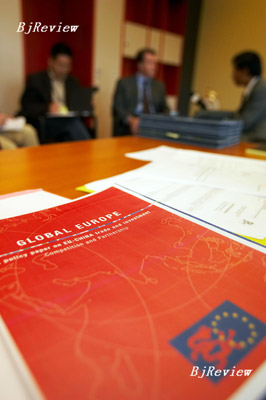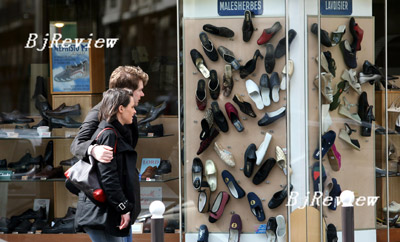|
 The past year saw a complicated relationship between China and the European Union (EU), with the emergence of elements of conflict against the background of generally favorable interaction. The past year saw a complicated relationship between China and the European Union (EU), with the emergence of elements of conflict against the background of generally favorable interaction.
Basically, bilateral relations have developed in a positive direction. In the political area, high-level exchanges of visits were frequent. From May to December, German Chancellor Angela Merkel, European Parliament President Josep Borrell Fontelles, Italian Prime Minister Romano Prodi, French President Jacques Chirac, EU Trade Commissioner Peter Mandelson and Cyprus President Tassos Papadopoulos paid consecutive visits to China.
In September, Chinese Prime Minister Wen Jiabao visited Finland, Britain and Germany, and attended the Ninth EU-China Summit held in Helsinki. The two sides also held a series of broader, high-level strategic dialogues, such as the dialogue between foreign ministers of China and EU countries, bilateral talks on government purchases and a Sino-EU business summit. These visits, consultations and dialogues have consolidated the political basis of the relationship between the two sides.
In the economic field, the momentum of cooperation maintained. According to statistics from the Chinese Ministry of Commerce, the bilateral trade volume in 2005 totaled $217.3 billion, and it amounted to $246.1 billion in the first 11 months of 2006, up 25.1 percent year on year. By the end of June 2006, China had introduced 22,855 technological items from the EU with a contractual value of $95.62 billion. The EU has invested in 24,033 projects in China, with a contractual value of $92.8 billion and paid-in capital of $50.56 billion.
In the field of science and technology, bilateral cooperation has been intensified, injecting vigor into the two sides' trade and economic relations. In last February, the Sixth China-EU Energy Conference was held in Shanghai. In September, the annual conference of the EU-China Information Society Project took place in Beijing at which experts from China and the EU exchanged views on the information development strategy. This cooperative project, which will last for three and a half years, involves around 220 million yuan provided by both sides. In October, a seminar on China-EU scientific and technological cooperation was held in Brussels. The seminar, touching on a broad array of topics, such as renewable energy, the environment, biotechnology, agriculture, food, animal health and the exchange of research personnel, discussed ways of bilateral cooperation within related R&D framework. On October 11, the China-EU Science and Technology Year was launched in Brussels under the theme of Cooperation for Sustainable Mutual Benefit.
Unfavorable elements
 Preceding this progress, China and the EU established a comprehensive strategic partnership in 2003, and in 2005 the two sides carried out diplomatic activities to commemorate the 30th anniversary of the establishment of bilateral relations. All these phenomena make people feel that China and the EU have entered a mature and deeper relationship. But, in fact, the strong political relations have often covered up conflicts and contradictions in the economic field. Preceding this progress, China and the EU established a comprehensive strategic partnership in 2003, and in 2005 the two sides carried out diplomatic activities to commemorate the 30th anniversary of the establishment of bilateral relations. All these phenomena make people feel that China and the EU have entered a mature and deeper relationship. But, in fact, the strong political relations have often covered up conflicts and contradictions in the economic field.
As time wore on to 2006, the complexity and uncertainty in China-EU relations emerged prominently. Europeans worry that a rapidly rising China will be a challenge or a threat to Europe, and the huge trade deficit with China is also a headache for European leaders. Against this backdrop, such fallacies as a "China threat" and "vigilance toward China" emerged, which has greatly affected European governments' policy-making toward China.
Although quite a number of Europeans hold that China's rise will not threaten the basic interests of Europe-former German Chancellor Helmut Schmidt said that Europeans have no need to fear China, and former British Foreign Secretary Douglas Hurd maintained that the "China threat" theory is groundless-the biased opinion has indeed affected the stance and attitude of the EU toward China.
On October 24 last year, the European Commission released a new document on EU's China policy. In the political document entitled "EU-China: Closer Partners, Growing Responsibilities," the EU stresses that Europe needs to have an effective response to China's reemergence.
"Competition and Partnership," the first document released by the EU on its trade policy toward China, set out a number of policy priorities on trade and investment with regard to China. The document stressed that China is a successful case of globalization, rather than a threat. But it also said that Europe should adjust itself to the competitive challenge from China, while China itself should reciprocate by strengthening its commitment to economic openness and market reform. The EU urged China to further open its market, revalue the renminbi, fulfill its World Trade Organization obligations and strengthen the fight against intellectual property rights infringements. It also asked China to fully open its banking industry by the end of 2006.
From the two documents, people will find that the EU is trying to seek a balance between the "theory of opportunity" and the "theory of threat." On the one hand, the EU pointed out that a well-off China is in the interest of the EU, as China has been a source of economic growth for Europe and the world. On the other, the EU claimed that China's current development mode has led to a serious trade imbalance with Europe, and asked China to shoulder its responsibility to stabilize and balance the world economy. Such a dual attitude reflects the contradiction in the EU's China policy, which can explain why the EU still hesitates to lift the weaponry embargo on China and recognize China's market economy status.
These issues show that bilateral relations are still affected by some uncertain factors. First, the two sides lack political mutual trust and an adequate coordination of interests. Although Chinese leaders have said in a clear-cut way on many occasions that China is following a peaceful development path and is not a threat to others, Europeans are still concerned about China's rise.
With regard to the contradictions and problems in their economic and trade relations, the two sides have not coordinated very well. A good complementarity in their bilateral trade has not emerged. What China needs is Europe's high technology, rather than high-priced low-technology products.
Second, the change in the leadership of key EU member nations may also affect the deepening of China-EU relations. During the tenure of former German Chancellor Gerhard Schroeder, Germany and China maintained a close cooperative relationship. For France, because of the friendly attitude of President Chirac toward China, the relations between the two countries have been more intimate. But now, Schroeder has stepped down, France will hold its presidential election in May, and British Prime Minister Tony Blair is also leaving, making future China-EU relations unpredictable.
Third, the inherent shortcomings in the EU's decision-making process cannot ensure the sound development of bilateral relations. As the EU is composed of 25 members currently, the interests of each member do not completely overlap with the common interests of Europe as a whole. The principle of unanimous agreement among all member states often leads to a situation in which EU members pass some general bills on EU-China relations while not being able to reach a consensus on specific issues concerning the interests of individual member states.
Take the anti-dumping case leveled against China by Europe last year for instance, although it only involved a few South European countries such as Italy, Portugal and Spain, it turned out to be a conflict between all of Europe and China based on the requirement for unanimous agreement, which disguised the fact that over half of the member states opposed imposing anti-dumping duties.
In the decision-making on its trade relations with China, the European Commission and the governments of its member states are mutually restricted, and they lack a unified trade and economic strategy toward China. Disputes have continued within the EU, both on recognizing China's full market economy status and signing the new pact on EU-China partnership relations.
Fourth, some other elements, such as a less competitive European economy, various social problems in Europe, Europe's integration process and the setback in the referendum on ratifying the European Constitution, also negatively affect the development of China-EU relations. Since China introduced its reform and opening policies over 20 years ago, it has maintained a sustained rapid economic growth and its comprehensive national strength has been enhanced.
During the period, however, European countries have suffered an economic depression. Accompanying the slumping economy, unemployment, the shortcomings of the social welfare system, conflicts over immigration and other social problems occurred.
Such an uneven development status between China and Europe will naturally affect the smooth development of bilateral relations. Many Europeans would like to criticize China's development and harp on the trade deficit European countries are running with China. They assume that Europe's economy will recover and their social problems will be resolved if EU's trade with China reaches an equilibrium.
In contrast to such simplistic views, some European statesmen and scholars have a rational view. Schmidt pointed out that if there were no low-priced products from China, Europeans would not be able to maintain a well-off life. In any case, China should not be blamed for causing a high unemployment rate in Europe. He stressed that a problematic labor market and an aging society are the real reasons for the problems.
The unfavorable elements in bilateral relations show that China and the EU need to strengthen their substantive dialogue and cooperation and seek common development with the consideration of the interests of both sides.
The author is a research fellow with the Chinese Academy of Social Sciences
| 